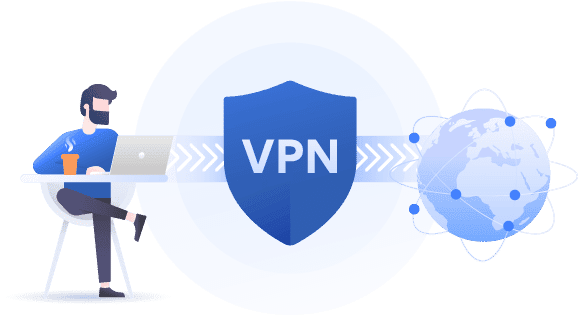As you delve into the world of Virtual Private Networks (VPNs), one term you’re likely to encounter is “VPN passthrough.” It’s a critical feature that enables VPN traffic to traverse your router, acting as a key player in your online security.
While modern VPN services like OpenVPN don’t require you to activate a VPN passthrough, you’ll find it necessary if you’re using older protocols such as PPTP and L2TP. Without it, your router might not recognize these outdated protocols, making it challenging to connect to your VPN.
So, let’s unpack the concept of VPN passthrough, why you may need it, and how it compares to a VPN router.
How does a VPN passthrough work?
To comprehend the functioning of VPN passthrough, we need to discuss Network Address Translation (NAT). This feature, commonly available in conventional routers, facilitates the transition of private IP addresses to public IP addresses, enabling data transfer.
NAT operates on detailed information regarding the connections entering and exiting your router. Older VPN protocols encrypt the connection, hindering NAT’s proper operation and obstructing traffic flow. This issue predominantly affects home routers, exposing significant security loopholes.
However, a VPN passthrough can navigate these challenges, allowing NAT to access data within IP packet headers. This feature is particularly beneficial for businesses providing remote access to their networks and requiring extensive IT monitoring.
Do you need a VPN passthrough?
The good news? You usually don’t need to fret over VPN passthrough. Here’s why:
- Standard Feature in Modern Routers: VPN passthrough comes pre-installed in current routers. So unless you’re using an outdated system, everything should function smoothly.
- Advanced Protocols from Reliable VPN Services: Reputable VPN providers ensure their clients have access to the latest network protocols, negating the need for passthrough capability in your router. However, if you opt for a free VPN service, your traffic might use older protocols, compromising your privacy and encryption.
- The necessity with Antiquated Operating Systems: If your operating system is relatively recent (no older than Windows XP), you should be able to utilize current VPN protocols. The need for older protocols that require a VPN pass-through arises only if you operate a significantly outdated system.
Distinguishing VPN Passthrough from a VPN Router
Despite similarities in their names, a VPN passthrough and a VPN router serve different purposes:
- VPN Passthrough: It refers to your router’s software capability to handle traffic from outdated VPN protocols like PPTP or L2TP.
- VPN Router: A VPN router is a device with pre-installed VPN client software. Any device accessing the internet via this router will have its traffic routed through a VPN server.
Frequently Asked Questions
Should I Enable VPN Passthrough?
If your VPN connection uses older protocols like PPTP and L2TP, enabling VPN passthrough is advisable. These protocols aren’t compatible with NAT, which routers utilize for mapping and redirecting packets on network devices. However, if your VPN uses current protocols, there’s no need to use VPN passthrough, as these work seamlessly with NAT.
Is VPN Passthrough Secure?
The protocols available with VPN passthrough aren’t inherently secure and might compromise your security for speed. If you’re serious about online security, consider deactivating VPN passthrough and using VPN connections with modern security protocols, such as OpenVPN.
How to Activate VPN Passthrough?
On most modern routers, you can access the router settings menu by typing the router’s address into your browser. Here, you can enable a VPN passthrough.
Wrapping Up
In essence, a VPN passthrough function enables your router to process traffic from older VPN protocols. In the early days of the internet, it was an indispensable feature, given that older protocols like PPTP and L2TP didn’t cooperate with NAT.
However, in the context of modern technology standards, the need for a VPN passthrough has diminished. Notably, reputable VPN service providers such as NordVPN employ advanced protocols that synergize with NAT, boosting your online security and speed without any hindrance.
While VPN passthrough can still have some utility for users operating outdated systems or protocols, for most users, relying on modern VPN services that support the latest protocols should suffice. Always keep in mind the importance of secure, reliable VPN services in preserving your privacy and ensuring your data’s security.
Check the latest offer link to enhance your online security with robust VPN services. From here on, you’ll enjoy worry-free browsing and the peace of mind that comes with rock-solid encryption. With the right tools at your disposal, you can confidently navigate the digital world.




